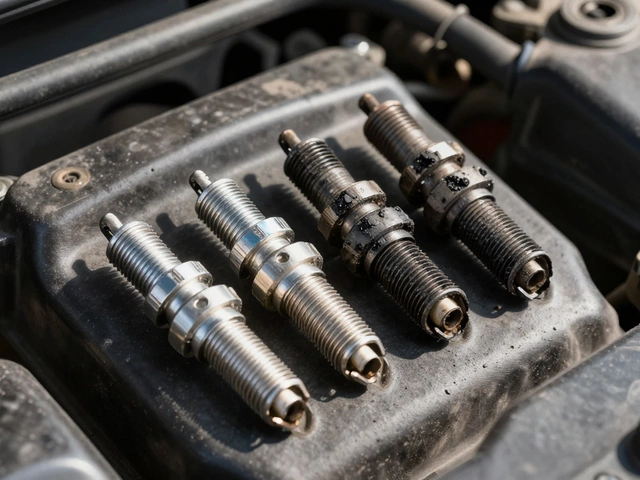When you think of a muffler, you probably picture it as the part of your car that keeps things quiet. And sure, it's a big part of its job, but there's a question on every car enthusiast's mind: Do mufflers actually boost gas mileage?
Mufflers are part of the exhaust system and mainly serve to reduce the noise produced by the engine's exhaust gases as they leave the vehicle. While their primary purpose is noise reduction, the way a muffler is designed can influence airflow, potentially affecting the engine's efficiency and, by extension, fuel consumption.
There are several types of mufflers, each with its own flow characteristics. Some performance mufflers are designed to maximize airflow, which can enhance engine performance and potentially improve gas mileage. However, it's not always a straightforward increase in fuel efficiency. Other factors, like car model and engine size, play a huge part too.
So, if you're aiming for better gas mileage, you might consider if your muffler is up to snuff. Proper maintenance or even upgrading to a more efficient model could make a difference. But remember, the impact varies, and it's wise to weigh these changes against other modifications you might make for better efficiency.
- The Role of a Muffler in Your Exhaust System
- Impact of Mufflers on Fuel Efficiency
- Choosing the Right Muffler
- Tips for Maintaining Your Muffler
- Beyond Mufflers: Other Ways to Enhance Mileage
The Role of a Muffler in Your Exhaust System
Let’s get one thing straight: the main job of a muffler is to quiet things down. It’s that simple. But how does it achieve such a feat while being kind of hidden in your car’s underbelly? The secret lies in clever engineering.
Mufflers are part of your vehicle’s exhaust system, which channels exhaust gases away from the engine, out of the car. Nestled deep within this system, the muffler works like a sound-canceling magician. Inside, a series of chambers and tubes create reflected waves that gobble up sound. This technique dramatically reduces the noise you hear when you pop the accelerator.
"A properly functioning muffler not only enhances the driving experience by reducing noise but also plays a role in maintaining optimum backpressure, which can affect engine performance," says John Miller, a leading auto part engineer at CarTech International.
What’s Inside?
The guts of a muffler are quite fascinating. Typically, you'll find a combination of perforated pipes, sometimes wrapped in sound-absorbing material. As exhaust gases move through, the design lowers the noise, preventing your morning commute from sounding like a NASCAR race.
However, beyond noise control, backpressure is a critical term here. This is the opposite force exerted by the exhaust gases on the engine. Proper management of this backpressure is important because it can impact engine efficiency. Too much backpressure and your engine will struggle; too little and you might mess with performance.
Muffler Types and Styles
Not all mufflers are created equal. There are several styles such as chambered mufflers, straight-through mufflers, and turbo mufflers, each affecting performance and sound differently:
- Chambered Mufflers: Use internal chambers to reflect sound waves and minimize noise. They're known for giving cars a beefier engine note.
- Straight-through Mufflers: These focus on minimal restriction and are generally louder. They can help with performance on sporty cars but might not be ideal for those looking to keep noise to a minimum.
- Turbo Mufflers: A mix of tactics used in both designs, aiming to balance sound reduction and performance.
Understanding how your muffler fits into the big picture of fuel efficiency means appreciating its role not just in sound control but also in the finer tuning of your car’s performance. Choose wisely, and you might find that sweet spot between a pleasant cabin noise level and smoother engine operation.
Impact of Mufflers on Fuel Efficiency
When it comes to fuel efficiency, the role of mufflers is more about how they can affect the overall airflow in an engine. You might think a muffler just quiets things down, but it subtly influences how well your car uses gas too.
Let’s break it down a bit. The design of a muffler affects the backpressure in your exhaust system. Backpressure, to put it simply, is the resistance the engine faces when pushing out exhaust gases. Too much backpressure can choke the engine, leading to inefficiency, while too little might not optimally suppress noise, compromising performance in other areas.
Performance Mufflers vs. Stock Mufflers
Performance mufflers are specifically designed to provide less resistance, meaning they can improve airflow. This can lead to better engine breathing and potentially boost gas mileage by a small margin. While a stock muffler might prioritize quietness and durability, a performance muffler prioritizes enhancing exhaust flow.
However, this doesn't mean every performance muffler will instantly ramp up your car's mileage. Gains are usually modest and depend heavily on the specific design and the overall harmony with the rest of the exhaust system. It's like adding a piece to a puzzle—everything needs to fit just right.
Considerations Before Switching
Before you run out and grab a high-flow muffler hoping for better mileage, consider a few things:
- Vehicle Type: Some cars benefit more than others from exhaust upgrades. High-performance or larger vehicles might see more improvement.
- Driving Habits: If you’re consistently heavy on the pedal, a new muffler might not save as much fuel as expected.
- Compatibility: Ensure any new muffler integrates well with your existing setup.
Real-World Data
In a study comparing fuel efficiency before and after exhaust modifications, cars with upgraded mufflers saw an average increase of 2-5% in fuel efficiency under optimal conditions. However, results can vary widely depending on other modifications, driving conditions, and the vehicle's inherent engine efficiency.
| Modification | Average MPG Change |
|---|---|
| Stock Muffler | No change |
| Performance Muffler | +2-5% |
Ultimately, while a muffler can slightly influence fuel efficiency, don't expect miracles. Pair it with other energy-saving practices for the best results.

Choosing the Right Muffler
Picking the right muffler can make a big difference not just in sound, but also in fuel efficiency and overall performance. But how do you know which one's right for you? Well, it starts with understanding your needs and your vehicle's specifics.
Consider Your Vehicle Type
Before anything else, consider what type of car you drive. Different cars have different requirements. For instance, a high-performance sports car might benefit from a different muffler compared to a regular sedan. The design and shape of the exhaust system vary, so the exhaust system setup plays a role.
Know Your Options
There are several types of mufflers out there. Here's a quick rundown:
- Absorption mufflers: These reduce noise by absorbing it, great for minimal sound and a boost in performance.
- Chambered mufflers: Ideal for those looking for a specific sound, they use chambers to cancel out certain sound frequencies.
- Turbine or Turbo mufflers: They offer reduced restriction and tend to balance sound with efficiency.
Noise Versus Performance
Sometimes, a muffler that promises more performance may produce more noise. Decide what balance suits you. If you enjoy the roar, go with a performance exhaust system. But if you prefer keeping things quiet, there are plenty of options focused on reducing sound without sacrificing efficiency.
Material Matters
Mufflers are typically made from materials like stainless steel or aluminum. Stainless steel is more expensive but lasts longer, especially in harsh weather conditions, whereas aluminum comes cheaper but might wear out quicker.
Muffler Stats to Consider
If you're into numbers, here's a quick table to help with a few choices:
| Muffler Type | Average Cost | Lifespan (years) |
|---|---|---|
| Absorption | $100 - $200 | 5 - 10 |
| Chambered | $70 - $150 | 3 - 7 |
| Turbine | $80 - $180 | 4 - 8 |
Choosing a muffler is not a one-size-fits-all deal. Weigh your options, consider your driving habits, and maybe even chat with a local mechanic or fellow car enthusiast to get their take. With the right choice, you can enhance your car's performance and enjoy the road a bit more!
Tips for Maintaining Your Muffler
Keeping your muffler in top shape is crucial not just for noise reduction but also potentially for your gas mileage. Here are some practical tips to ensure your muffler and exhaust system stay in prime condition.
1. Regularly Inspect for Damage
Every once in a while, take a peek underneath your car to check for rust or holes in the muffler. Rust is the main culprit that can eat away your muffler, especially if you live in a place with harsh winters where road salt is common.
2. Listen and Feel
Pay attention to any unusual sounds, like rattling or increased noise, as these can be signs of a problem. If your ride feels more like a noise machine than before, it might be time to give that muffler a closer look.
3. Seal the Deal
Checking and sealing any small leaks with a high-temperature exhaust sealer can prevent minor issues from becoming big headaches. This simple step can go a long way in maintaining your exhaust system.
4. Keep It Clean
Removing dirt, grime, and debris from your exhaust pipe and muffler can prevent build-up that could eventually lead to blockages or increased rust.
5. Professional Check-Ups
Consider having your exhaust system checked by a professional annually. They'll spot issues that you might overlook and ensure everything is running smoothly.
6. Stay Observant of Emissions
If you notice changes in your car's emissions output, like smoke of different colors, it could mean your muffler's not doing its job right. Keep an eye on this to avoid bigger issues later.
With these tips, you can help keep your muffler working efficiently, and who knows, you might even get that fuel efficiency boost you're after!

Beyond Mufflers: Other Ways to Enhance Mileage
Sure, a muffler can contribute to fuel efficiency, but there's more to squeezing out that extra mile from every gallon. Let's dive into some practical ways to enhance your vehicle's gas mileage, leaving the exhaust system behind (pun intended).
Regular Maintenance
Keeping your car in top shape is crucial. Regular oil changes, timely replacement of air filters, and using the right fuel type can keep your engine running efficiently. Remember, a well-oiled machine burns fuel more effectively. If you're running with a dirty air filter or burning low-quality fuel, you're just wasting gas.
Proper Tire Inflation
Believe it or not, tire pressure affects fuel efficiency big time. Under-inflated tires create more resistance and make your engine work harder, thus consuming more fuel. It's a simple fix: checking and maintaining the right tire pressure can actually help you go that extra mile.
Drive Smart
Your driving habits can greatly influence your exhaust system (and your pocket). Try to avoid rapid acceleration and heavy braking, keeping your speed consistent. Using cruise control on highways can help maintain that perfect speed sweet spot where fuel consumption is optimized.
Reduce Weight
Every additional pound makes your car work harder. Clear out unnecessary items from your trunk and backseat to relieve your vehicle's load. It might not seem like much, but it can shave off a percentage from your fuel bills over time.
Aerodynamics Matter
Consider the aerodynamic drag; it's the enemy of fuel efficiency. Remove unnecessary roof racks or carriers when not in use to minimize wind resistance. It's a minor adjustment that pays off in the long run.
| Tip | Estimated Efficiency Gain |
|---|---|
| Tire Pressure | 1-3% |
| Regular Maintenance | 4-7% |
| Smart Driving | 5-10% |
| Weight Reduction | 1-2% |
Making these adjustments won't just help your wallet; they'll also contribute to a healthier planet by reducing your carbon footprint. No one thing will transform your car into a fuel sipper overnight, but together, these practices can make a noticeable difference.







Write a comment